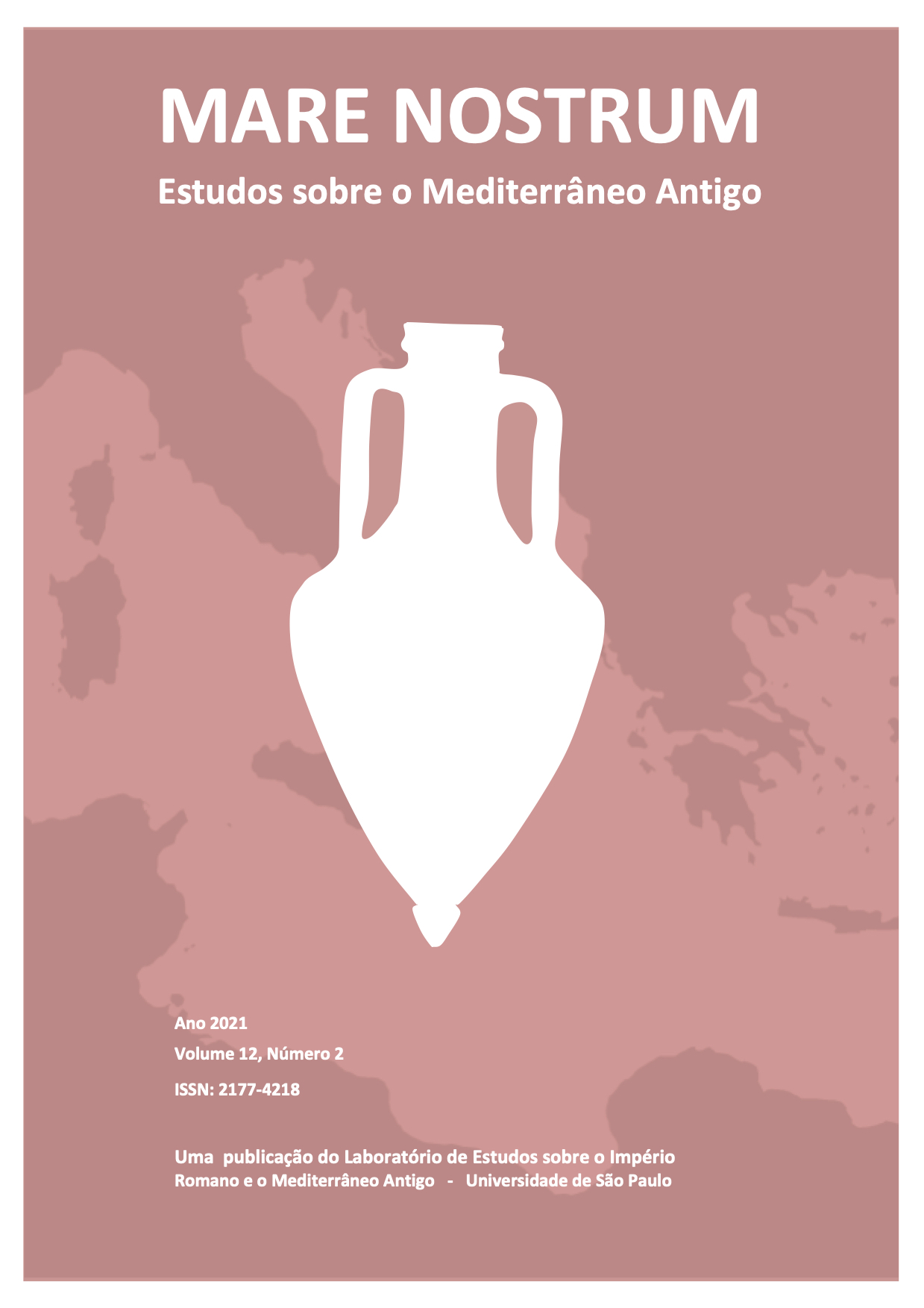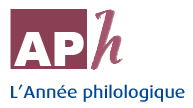Field Notes from the Odyssey: The Fabulous Ethnography of Aiolie, Aiaie, and Ogygie
DOI:
https://doi.org/10.11606/issn.2177-4218.v12i2p1-18Palavras-chave:
Ethnography, Odyssey, Islands imaginary, Island as metaphor, 'Ethnographic savage'Resumo
Odysseus’ ethnographic digressions in books 9-12 of the Odyssey—the so-called Apologue—have served as the premier paradigm for mythic and actual ethnography from Herodotus through Marco Polo and Christopher Columbus, and more particularly, for the ‘I-witnessing approach’ of ethnography. Among the peoples and lands and styles of thinking he encountered (Odyssey 1.3), the hero also became acquainted with several islands. As microcosms of larger societies, islands furnish ‘master metaphors’ and models with which to think about culture. In this article I discuss three islands from the Apologue in the chronological order of Odysseus’ travels. They are inseparable from their geography and the personality and ‘life style’ of their inhabitants, as will be seen; these islands adumbrate the moral and gendered mythic cartography of Archaic Greece.
Downloads
Referências
Bakker, E. J. (2013), The meaning of meat and the structure of the Odyssey, Cambridge.
Carpi, D. (2020), ‘The island metaphor in literature and law’, Pólemos 14.2: 225-35.
Chantraine, P. (1968), Dictionnaire étymologique de la langue grecque, Histoire des mots, Paris.
Conkling, P. (2007), ‘On islands and islandness’, Geographical Review 97.2: 191-201.
Dawe, R. D. (1993), The Odyssey: translation and analysis, Sussex, England.
de Jong, I. J. F. (2001), A narratological commentary on the Odyssey, Cambridge.
Ernst = Ernst, N. (2006), ed., Die D-Scholien zur Odyssee, Kritische Ausgabe, Köln.
Geertz, C. (1988), Works and lives: the anthropologist as author, Stanford.
Gera, D. L. (2003), Ancient Greek ideas on speech, language, and civilization, Oxford.
Heubeck, A., West, S., and Hainsworth, J. B. (1988), A commentary on Homer’s Odyssey, Vol. I: Introduction and Books I-VIII, Oxford.
Heubeck, A., and Hoekstra, A. (1989), A commentary on Homer’s Odyssey, Vol. II: Books IX-XVI, Oxford.
Homeric Problems (Russell-Konstan) = Heraclitus: Homeric Problems, ed. & tr., Russell, D.A., & Konstan, D. (2005), Atlanta, GA.
Leach, E. (1982), Social anthropology, Glasgow.
Lestringant, F. (2016), Jean de Léry ou l’invention du sauvage, Essai sur l’ Histoire d’ un voyage faict en la terre du Brésil, 2006.
Lowenthal, D. (2007), ‘Islands, lovers, and others’, Geographical Review 97 (2), 202-29.
LSJ = Greek-English lexicon, 9th edn with a rev. supplement, Liddell, H.G., Scott, R., Jones, H.S., McKenzie, R., Oxford, 1968, 1996.
Montanari = Montanari, F. (2015), The Brill Dictionary of Ancient Greek, Leiden & Boston.
Nagy, G. (2018), ‘A sampling of comments on Odyssey Rhapsody 1’, Classical Inquiries 2018.10.16, https://classical-inquiries.chs.harvard.edu/a-sampling-of-comments-on-odyssey-rhapsody-1/
Petropoulos, J.C. B. [Ioannis] (1989), ‘The Church Father as social informant: St John Chrysostom on folk-songs’, in E. Livingstone (ed.), Studia Patristica XXII, Leuven, 159-64.
Petropoulos, J.C. B. [Ioannis] (2008), ‘Some new thoughts on the old ‘‘New Archilochos’’ Fr. 196 A West2 ’, in D. Katsonopoulou, I. Petropoulos, & S. Katsarou (eds), Ο Αρχίλοχος και η εποχή του/Archilochos and his age: Paros II, Eκδ. Ινστιτούτου Αρχαιολογίας Πάρου και Κυκλάδων (The Paros & Cyclades Institute of Archaeology), Αthens, 123-31.
Petropoulos, J.C. B. [Ioannis] (2011), Kleos in a minor key: The Homeric education of a Little Prince, Washington, D.C. & Cambridge, MA [http://nrs.harvard.edu/urn-3:hul.ebook:CHS_Petropoulos.Kleos_in_a_Minor_Key.2011]
Petropoulos, J.C. B. [Ioannis] (2013), ‘La définition de la civilisation par les Grecs classiques’, Anatoli 4 (Automne 2013): 43-56.
Petropoulos, J.C. B. [Ioannis] (2019)a, ‘Enchanted wine in the Odyssey’, in Maria do Céu Fialho & Maria Regina Candido (eds), Magia e Superstição no Mediterrãneo Antigo, Universidade de Coimbra, Portugal, 179-187.
Petropoulos, J.C. B. [Ioannis] (2019)b, ‘Os Residentes da Via Negativa: Os Cíclopes de Homero e os Tupinambá’, Hélade/Dossiê: Etnicidade e formação de identidades no mundo de Homero 5.1: 150-163 [http://periodicos.uff.br/helade/issue/view/1589/showToc].
Putz, G. (1984), ‘On islanders’, Island Journal 1:26-9.
Renehan, J. (1981), ‘The Greek anthropocentric view of man’, HSCP 85: 239-59.
Romm, J. S. (1992), The edges of the earth in ancient thought, Princeton, NJ.
Ronström, O. (2013), ‘Finding their place: islands as locus and focus’, Cultural Geographies 20(2), 153-65.
Skinner,J. E. (2012), The invention of Greek ethnography, Oxford.
West, M. L. (1997), The east face of Helicon: West Asiatic elements in Greek poetry and myth, Oxford.
West, M. L. (2014), The making of the Odyssey, Oxford.
Downloads
Publicado
Edição
Seção
Licença
Copyright (c) 2021 Ioannis Petropoulos

Este trabalho está licenciado sob uma licença Creative Commons Attribution 4.0 International License.
Os conteúdos expressos nos textos publicados pela Mare Nostrum são de exclusiva responsabilidade de seus respectivos autores.
A reprodução dos textos editados pela Mare Nostrum é permitida sob licença Creative Commons, Atribuição-NãoComercial (CC BY-NC).
Autores que publicam nesta revista concordam com os seguintes termos:
- Autores mantém os direitos autorais e concedem à revista o direito de primeira publicação, com o trabalho simultaneamente licenciado sob a Licença Creative Commons Attribution que permite o compartilhamento do trabalho com reconhecimento da autoria e publicação inicial nesta revista.
- Autores têm autorização para assumir contratos adicionais separadamente, para distribuição não-exclusiva da versão do trabalho publicada nesta revista (ex.: publicar em repositório institucional ou como capítulo de livro), com reconhecimento de autoria e publicação inicial nesta revista.
- Autores têm permissão e são estimulados a publicar e distribuir seu trabalho online (ex.: em repositórios institucionais ou na sua página pessoal) a qualquer ponto antes ou durante o processo editorial, já que isso pode gerar alterações produtivas, bem como aumentar o impacto e a citação do trabalho publicado (Veja O Efeito do Acesso Livre).









